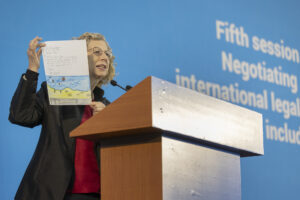
The sixth meeting of the Open-ended Committee of Permanent Representatives (OECPR-6) of the United Nations Environment Assembly (UNEA) started off with a renewed sense of commitment to move things forward to enable accelerated actions regarding the triple planetary crisis.
United Nations Environment Programme (UNEP) Executive Director Inger Andersen, in her opening remarks, noted that in these times, multilateralism must demonstrate its ability to transcend geopolitical strife and deliver action on the triple planetary crisis.
She highlighted recent successes and work undertaken by UNEP and various multilateral environmental agreements to illustrate UNEP’s focus on being global and fit for purpose and concluded that this meeting will be an opportunity for Member States to build a bridge between UNEA and the Summit of the Future to be held later this year.
In their opening statements, some Member States stressed the need to take into account the impact that geopolitical strife has had on the environment and its regression, and upholding the principle of common but differentiated responsibilities where the impacts of climate change and its causes are considered. There was also a notable tone of frustration heard in statements delivered by Major Groups and Stakeholders, who echoed each other’s sentiments about the continued lack of meaningful inclusion in meetings such as this one.
The agenda and proposed way forward for the organization of work was swiftly adopted and agreed upon by delegates – 22 draft resolutions, clustered in 5 thematic clusters, will be discussed in two parallel working groups (WG) over the next two days, with plenary to take stock of progress on Wednesday. Each WG, working late into the night hours, is supposed to cover the following thematic clusters:
- abating pollution and promoting sound management of chemicals and waste (Cluster A);
- halting and reversing the loss of nature while restoring ecosystems (Cluster B);
- international environmental governance (Cluster C);
- addressing root causes of climate change, nature and biodiversity loss, and pollution (Cluster D);
- procedural, budgetary, and administrative matters (Cluster E).
As soon as delegates moved into working groups, the weight and complexity of the task became abundantly clear since little progress was made and no WG progressed much further than preambular paragraphs in their draft resolutions.
Overall, the first day of OECPR demonstrated that while there is unity amongst delegates, representatives have also convened at UNEP headquarters in Nairobi with different priorities to see reflected in the resolutions being prepared for UNEA-6.







